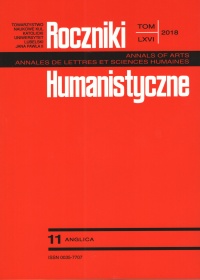Terms between Standardization and the Mental Lexicon
Abstrakt
Terminy pomiędzy standaryzacją a mentalnym leksykonem
Według klasycznej terminologii, odzwierciedlonej w pracach Eugena Wüstera, znaczenie wyrazów powinno być precyzyjne. Kognitywna teoria prototypu stwarza egzystencjalne zagrożenie dla tego podejścia, zakładając istnienie stopniowego przejścia od klarownych przykładów danego pojęcia do jednostek leksykalnych niebędących tegoż pojęcia egzemplifikacją, wykluczając możliwość wytyczenia granicy oddzielającej jedne od drugich. Analiza terminów z różnych dziedzin sugeruje, że powinniśmy rozgraniczyć dwa rodzaje pojęć: terminy w znaczeniu zawężonym (TiNS) oraz terminy wyspecjalizowane. W przypadku terminów wyspecjalizowanych nie jest problemem, że struktura konceptów oparta jest na prototypie. W przypadku TiNS konieczne jest klarowne sformułowanie znaczenia.
Uznanie, że terminy w znaczeniu zawężonym są specyficzną grupą pojęć, stawia nas przed pytaniem o ich status jako jednostek językowych. Nie istnieje empiryczna podstawa umożliwiająca stwierdzenie istnienia jakiegoś wyrazu w języku angielskim (czy też w innym języku), ponieważ ani język angielski, ani żadne z angielskich słów nie są empirycznie doświadczalne. Istnieją jako teoretyczne uogólnienia na temat kompetencji mówcy. TiNS są inne. Istnieją jako jednostki abstrakcyjne w ten sam sposób co utwory muzyczne.
Bibliografia
Arntz, Reiner, Heribert Picht, & Klaus-Dirk Schmitz. 2014. Einführung in die Terminologiearbeit. 7. Aufl. Hildesheim: Olms.
Chomsky, Noam. 1965. Aspects of the Theory of Syntax. Cambridge, MA: MIT Press.
Chomsky, Noam. 1976. “On the Biological Basis of Language Capacities.” In Robert W. Rieber (ed.). The Neuropsychology of Language: Essays in Honor of Eric Lenneberg, 1-24. New York: Plenum.
van Dale. 1992. Van Dale Groot Woordenboek der Nederlandse Taal. 12th ed., edited by Guido Geerts and Hans Heestermans. Utrecht/Antwerpen: Van Dale Lexicografie.
ten Hacken, Pius. 2007. Chomskyan Linguistics and its Competitors. London: Equinox.
ten Hacken, Pius. 2008. “Prototypes and Discreteness in Terminology.” In Elisenda Bernal and Janet DeCesaris (eds.). Proceedings of the XIII Euralex International Congress, 979-987. Barcelona: IULA-UPF.
ten Hacken, Pius. 2009. “What is a Dictionary? A View from Chomskyan Linguistics.”, International Journal of Lexicography 22: 399-421. https://doi.org/10.1093/ijl/ecp026.
ten Hacken, Pius, and Renáta Panocová. 2011. “Individual and Social Aspects of Word Formation.” Kwartalnik Neofilologiczny 58: 283–300.
ten Hacken, Pius. 2012. “In what sense is the OED the definitive record of the English language?” In Ruth V. Fjeld and Julie M. Torjusen (eds.). Proceedings of the 15th EURALEX International Congress, 834–845. Oslo: Dept. of Linguistics.
ten Hacken, Pius. 2015. “Terms and Specialized Vocabulary: Taming the Prototypes.” In Hendrik J. Kockaert and Frieda Steurs (eds.). Handbook of Terminology. Vol. 1, 3–13. Amsterdam: Benjamins.
IAU. 2006. “IAU 2006 General Assembly: Result of the IAU Resolution votes.” IAU – International Astronomical Union. Accessed 15 February 2018. https://www.iau.org/news/pressreleases/detail/iau0603/.
IFAB. 2017. Laws of the Game 2017/18. Zürich: International Football Association Board.
Jackendoff, Ray. 2002. Foundations of Language: Brain, Meaning, Grammar, Evolution. Oxford: Oxford University Press.
Labov, William. 1973. “The Boundaries of Words and Their Meanings.” In Charles-James N. Bailey and Roger W. Shuy (eds.). New Ways of Analyzing Variation in English, 340-373. Washington, DC: Georgetown University Press.
Lerdahl, Fred, and Ray Jackendoff. 1983. A Generative Theory of Tonal Music, Cambridge, MA: MIT Press.
Margolis, Howard. 1993. Paradigms and Barriers: How Habits of Mind Govern Scientific Beliefs. Chicago: University of Chicago Press.
OED. 2018. Oxford English Dictionary. 3rd ed. Oxford: Oxford University Press. | OED. Oxford English Dictionary. The definitive record of the English language. Accessed 15 February 2018. www.oed.com.
Rosch, Eleanor. 1978. “Principles of Categorization.” In Eleanor Rosch and Barbara B. Lloyd (eds.). Cognition and Categorization, 27-48. Hillside, NJ: Lawrence Erlbaum.
Saussure, Ferdinand de. 1916/1981. Cours de linguistique générale, edited by Charles Bally and Albert Sechehaye. Édition critique préparée par Tullio de Mauro. Paris: Payot.
Temmerman, Rita. 2000. Towards New Ways of Terminology Description: The Sociocognitive Approach. Amsterdam: Benjamins.
Thèses. 1929. “Thèses présentées au Premier Congrès des philologues slaves.” Travaux du Cercle Linguistique de Prague 1: 5–29.
Wikipedia.nl. 2018. Wikipedia: De vrije encyclopedie. Accessed 15 February 2018. nl.wikipedia.org.
Wüster, Eugen. 1931. Internationale Sprachnormung in der Technik, Berlin: VDI.
Wüster, Eugen. 1979. Einführung in die allgemeine Terminologielehre und terminologische Lexikographie, edited by L. Bauer, Wien: Springer.
Zuivelonline (2018). “Leeftijd van kaas.” Zuivel online. Accessed 15 February 2018. zuivelonline.nl/zuivel/kaas/leeftijd-van-kaas.
Copyright (c) 2018 Roczniki Humanistyczne

Utwór dostępny jest na licencji Creative Commons Uznanie autorstwa – Użycie niekomercyjne – Bez utworów zależnych 4.0 Międzynarodowe.





